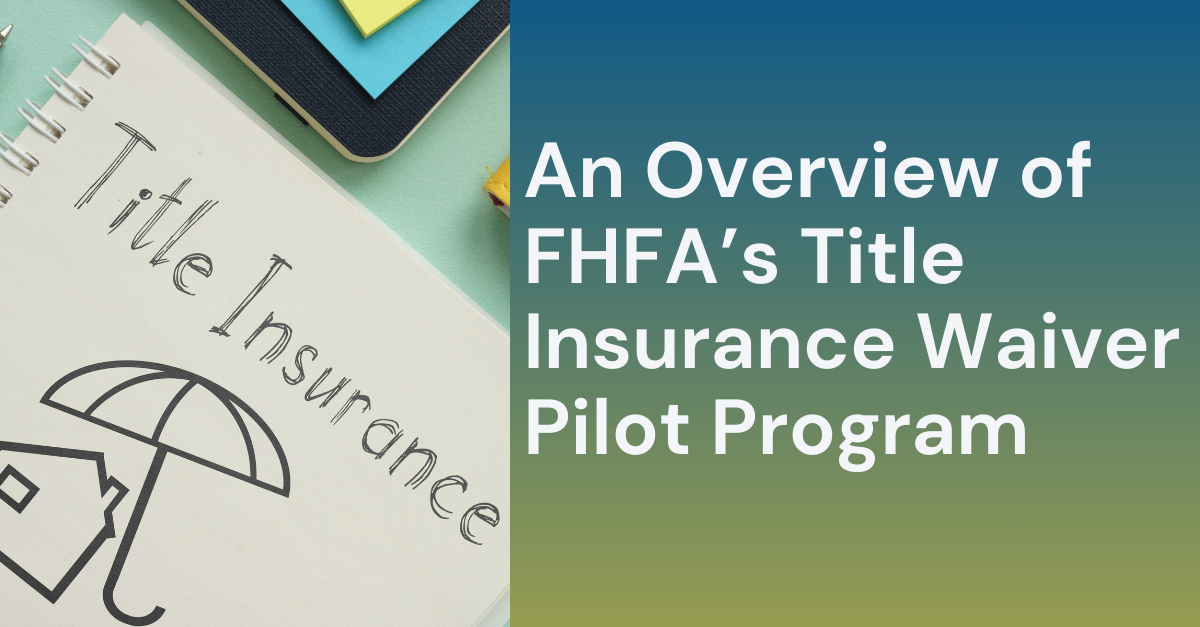
The FHFA has introduced a "pilot" program that replaces title insurance on refinances with automated public record searches. To get an overview of this program, our Chairman, Jerome Jelinek, has shared some insight into its potential benefits and drawbacks.
Could you give us some background on the proposal "pilot"
program: What's involved, how it will work and the rationale for it?
As I understand it, the pilot is intended to reduce the cost of refinances by replacing lenders’ title policies with a waiver based on a database search. The idea was first proposed in 2023, but at the time was met by a fair amount of industry pushback and was shelved. It was resurrected by the GSEs after President Biden’s recent State of The Union address.
The pilot’s stated goal of addressing the housing affordability problem is laudable, but when you drill down into the details, and they’re still somewhat vague, I believe the program will miss that mark by a long shot.
The way the program works is that Fannie Mae would do an automated search using a property database or databases — it’s still unclear which ones — and if the search indicates a low risk, then that title process goes forward without any additional search or insurance. If it comes back as something other than low risk, then the process stops, and the lender would then go back to the existing process of securing title insurance.
The pilot at this point is not mandatory. Lenders can opt in or out, which is also a little unclear. Also, the pilot only applies to low-risk refinances, and it excludes certain property types.
There are, in my opinion, several real issues with this approach, not the least of which is that it’s clunky and less efficient than what’s in place right now, and, at the end of the day, it may not actually lower costs.
What do you see as the major issues?
The first issue is risk. Right now, a lender’s title policy provides significant benefits, primarily ensuring that a loan is in first lien position and that the lien is enforceable. The pilot would shift that risk to Fannie Mae, which would be, in effect, acting as a title insurer. The lender would warrant that the property has a marketable title with no outstanding encumbrances and would pay Fannie Mae a new fee for this coverage. In the event a problem is missed — and if history is any judge, a lot of defects will be missed — Fannie agrees not make the lender repurchase the loan.
As industry surveys show, the problem with relying only a public record search is that almost a third of all title defects that result in claims involve issues that are not recorded in the public record: things like unrecorded documents, misindexed documents, and really importantly now, fraud and forgery. Eliminating lenders’ policies could potentially result in more costs down the road once those types of claims flow through the program. In 2022, the title industry paid almost $600 million in claims. They aren’t going to go away. And in fact, the numbers could get higher, since a significant number of issues are caught and cured in the title search process, and this wouldn’t happen with the proposed new program.
The next question is, will it really lower costs? The agencies are saying that it should save roughly $1,000 per loan. But lenders will have to pay a new fee to Fannie for assuming that risk, and that will likely have to be passed on to the borrower. In a recent article in HousingWire, ALTA’s CEO Diane Tomb noted that the total fees that lenders pay to sell a loan to Fannie are already six times the average cost of title insurance for a refinance. And here is an additional fee. None of that’s disclosed in the program at this point. By the way, a lender’s policy on an average price home here in Michigan is about $1,050.
Also, important to note is that a lot of properties would fall outside of the pilot. For example, condominiums are completely excluded. That takes care of a big swath of the state of Florida. Also excluded are any properties that are subject to restrictions or covenants of record. If you think about it, every subdivision has restrictions, as do planned unit developments. So, the pilot will have some pretty significant gaps.
You believe that misconceptions about the value of title insurance are behind some of these changes, right? Can you elaborate?
Outside of our industry there is a lack of understanding of the difference between the title insurance and the casualty insurance. Critics often point out that casualty insurers pay out 70% of their premiums in claims, while title insurers only pay out 10% or less in claims. So, the optics are that the title insurance industry must be reaping huge profits. But you’re comparing apples to oranges. With casualty insurance very little of that premium is spent prior to the insurance being put in place. The premium is used to cover the eventuality of a loss that’s going to take place in the future. And, by the way, that premium is annual for the life of the policy. In title insurance, most of that one-time premium paid at closing goes to the expenses that are incurred searching the records and curing title issues before the policy is issued. So, if we do our jobs right as an industry, claims should be low, and they are currently in the 5% to 10% range.
Earlier we talked about the surveys that show almost a third of defects are uncovered and corrected prior to closing. Without the title insurance process, the claims would be higher.
The pilot is also shortsighted because it overlooks what else title insurance companies do besides just providing that loan policy: they have a network that closes loans in every one of the 3,143 counties in the United States. This process prevents a great deal of fraud. And who’s going to do these first mortgage refinance closings under the pilot program? Lenders? Today, lenders do this on the home equity side, but closing these loans in their branches can be challenging. Think about what it would take for a larger lender with hundreds of branches throughout the country to get all the closing documents to the branches, obtain all the necessary signatures then get them back to one central location for disbursement and recording in a timely manner. It’s almost an impossible management task when you are talking about thin-file home equity packages with 10 or so pages. Now multiple that number of pages by five or more for refinance packages.
Again, the pilot is shifting from what is an efficient closing process to a clunky, less efficient one.
So, if replacing title insurance isn't the answer to housing affordability, what is?
I’m not a housing economist, so I defer to those that are. But, stop and think about the price escalation that we’ve seen over the past four years: Case Shiller says home prices are up more than 47% since 2020. Is title insurance really the issue? ALTA points to some of the actual causes: A lack of affordable housing, local regulations that make development more difficult and expensive, and 11 rate hikes from the Fed from early 2022 through mid-2023. Additionally, as Mark Levy pointed out in a recent blog, attempting to increase homeownership by reducing the cost of refinancing, doesn’t make much sense.
First, under the current high interest environment, there are very few refinances taking place. And, reducing the cost of refinances thereby increasing the volume of refinances, will actually reduce purchase activity further reducing inventory which drives home prices up! So, if you’re serious about addressing affordability, it’s not title insurance that is making homes unaffordable. Title insurance is a critical product protecting the value of home ownership that is a very minor component of the overall cost to purchase a home. As indicated, there are many higher priorities directly causing housing price escalation that deserve immediate attention. Unfortunately, the GSE’s refinance Pilot Project does not focus on those high priorities and will do nothing to resolve the problem.

Jerome founded Corporate Settlement Solutions (CSS) in 1992 and served as CEO and Founder until transitioning into the Chairman role.
Jerome assists with the strategic direction of the company and leverages 30+ of industry experience to lead revenue strategy and execution. He also oversees the legal and regulatory functions of the company.
Our team is highly engaged in delivering results that make our customers more efficient, effective, and profitable.
Contact [email protected] to get started!


